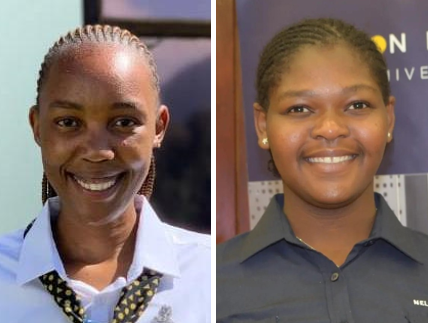Mandela University Student Entrepreneurs Embark on International Exchange
Student Women Economic Empowerment Programme (SWEEP) chairpersons, Nelisiwe Sishange and Phuthego Nthoke, have been nominated to represent Nelson Mandela University on a UK residential knowledge exchange study from 25 May to 1 June.
Supported by Entrepreneurship Development in Higher Education (EDHE) and the British Council, the programme raises awareness of entrepreneurship among female students and graduates.
It also connects women with mentors from the UK and South Africa, to guide them on their entrepreneurial journey.
As a response to the realities of women’s under-representation in entrepreneurship and gender-based violence, the SWEEP programme aims to equip female students and graduates across public universities in SA for entrepreneurial activities.
Nelisiwe (left), who serves as SWEEP chairperson on George Campus, alongside Gqeberha chairperson, Phuthego (right) will be accompanied by student entrepreneurship specialist, Karen Snyman, who has championed the establishment of the first SWEEP chapter at Mandela University.
To date, there 10 SWEEP chapters across the 26 public universities.
The week-long journey in London will entail a series of workshops, site visits, and network events, designed to inspire and empower.
“Nelson Mandela University has been the cornerstone of my academic and personal growth and having this opportunity to showcase its values and achievements on an international level, is truly special,” said Nelisiwe, a final year Management Diploma student.
“This exchange programme will provide me with a broader perspective on the world of entrepreneurship and create business opportunities that have a positive societal impact,” she added.
Phuthego, who is studying towards an Advanced Diploma in Public Relations Management, after completing her Diploma with distinction last year, echoed similar sentiments to her co-chairperson.
“I am not just representing myself in this exchange, but also women from other universities, and I will try to retain as much as I can so that I can also bring back information that will hopefully help us going forward,” said Phuthego.
Involving women in entrepreneurship programmes is crucial for fostering economic development, driving innovation, promoting social equity, enhancing community well-being, and tapping into a wealth of untapped potential.

